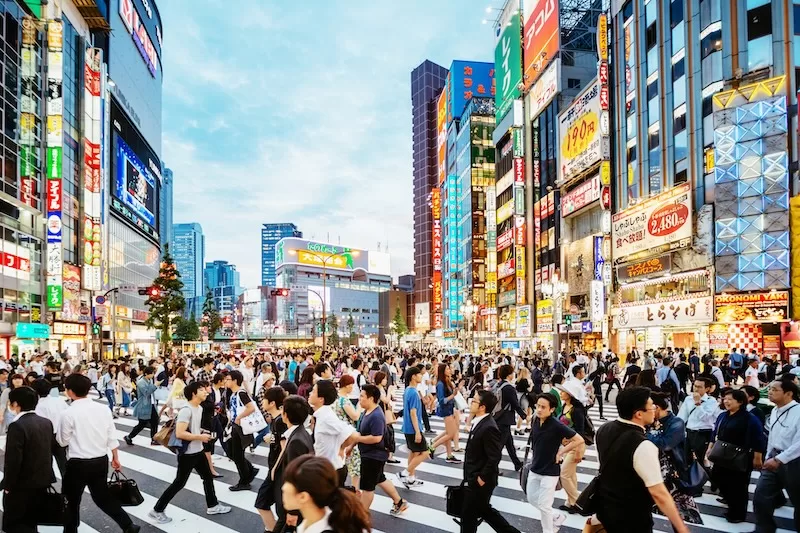To arrive in the Japanese capital, Tokyo, can be a sensorially confounding experience. It is a city of some 30 million people, with troops of skyscrapers stampeding across it, often draped in hyper-realistic digital screens that shine like constellations of capitalism come down to earth. But there is also a hush at the heart of the city’s great shrines and temples, where swirls of incense spiral in dreamlike shapes. Having lived in Japan for four years, here are my top ten tips on how best to navigate the country; what to notice and what to know.
#1. Cash Is King
In the popular imagination, Japan is a high-tech conurbation of robots and gadgets. But in reality, living there can feel like being stuck in the 1980s, when fax machines were haute-tech and neon passed for cutting-edge. The country got rid of floppy disks to complete government procedures only about a year ago. Opening bank accounts and making digital payments remains surprisingly difficult, and many restaurants and shops only accept cash. Switzerland-based IMD’s World Digital Competitiveness Ranking, put Japan at 31 out of 67 countries, far behind China which came in at #14. It pays to always keep some cash handy.
#2. What Is Lost Is Invariably Found
The level of social honesty in Japan is truly inspiring, Between the four members of my family, we lost wallets, lunch boxes, phones, jackets, metro passes and a laptop. We recovered every single item, sometimes within hours. Not a sterling recommendation for our family’s personal habits, but a ringing endorsement of Japan. According to the Tokyo Metropolitan Police Department’s “Acceptance Status of Notification of Found Items and Notifications of Lost Items,” conscientious finders handed over more than 4.4 million lost items to police in 2023. The number of found objects handed in was about four times the number of missing item complaints filed. And it isn’t just umbrellas being handing in, although there were an awful lot of these, but even hard cash. Across Japan there is an 87.5 percent chance of finding lost money, a number calculated based on complaints received by the police against found hand ins. In 2023, 4.4 billion yen in cash was returned to owners.
Click here to get the necessary forms in English and steps to report lost items to the Tokyo Metropolitan police.
#3. Garbage Disposal Is Serious Business
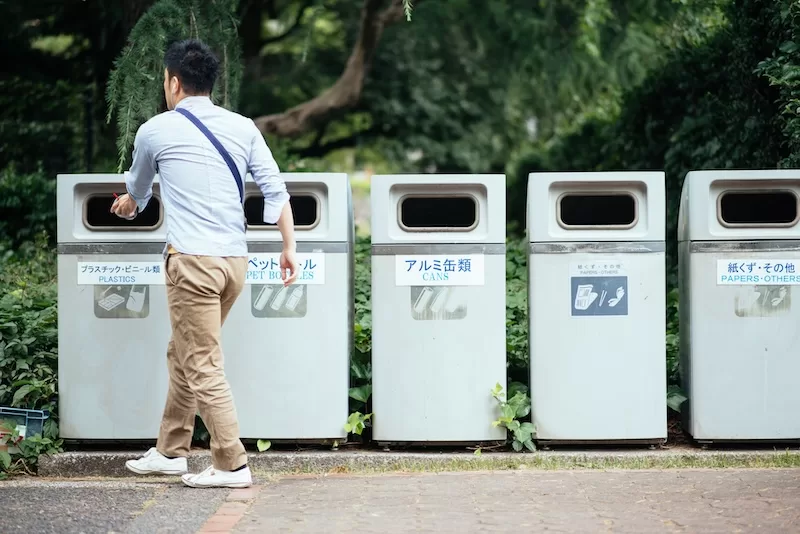
Japan’s garbage recycling system is truly operatic in scale and complexity. Legislation dating to the late 1990s mandates that every household has to separate waste into burnable and non-burnable categories. But this is just the tip of the recycling iceberg. There is a vertiginous array of categories to further sort non-burnable into plastic and PET (polyethylene terephthalate), cardboard, and glass, spray cans, and old cloth. The municipality I lived in issued residents with an Iliad-sized manual on how to sort some 500 different items. For example: lipstick was usually “burnable”, but an empty tube went into “small metals”. If the trash is sorted incorrectly, it is not collected. Instead, a large red sticker is pasted prominently on the bags, leaving the offender crushed under the weight of neighborhood social shame.
#4. The Rail Infrastructure Is World-beating

Trains in Japan are almost supernaturally on time. One of my favorite anecdotes is an incident in November 2017 when an express line between Tokyo and the city of Tsukuba departed 20 seconds early, at 9:44:20 AM instead of 9:44:40 AM. The line’s management issued a “sincere” apology “confessing” that the crew had not “sufficiently checked the departure time. High speed trains or Shinkansen are so efficient that Harvard Business school has done a case study on them (https://www.hbs.edu/faculty/Pages/item.aspx?num=48436). The trains are fully cleaned after each trip in exactly seven minutes, a routine that is as precisely calibrated as an Olympic synchronized swim squad.
Read more like this: Wading Into Japan’s Complex Onsen Culture
#5. Make Friends With Vending Machines
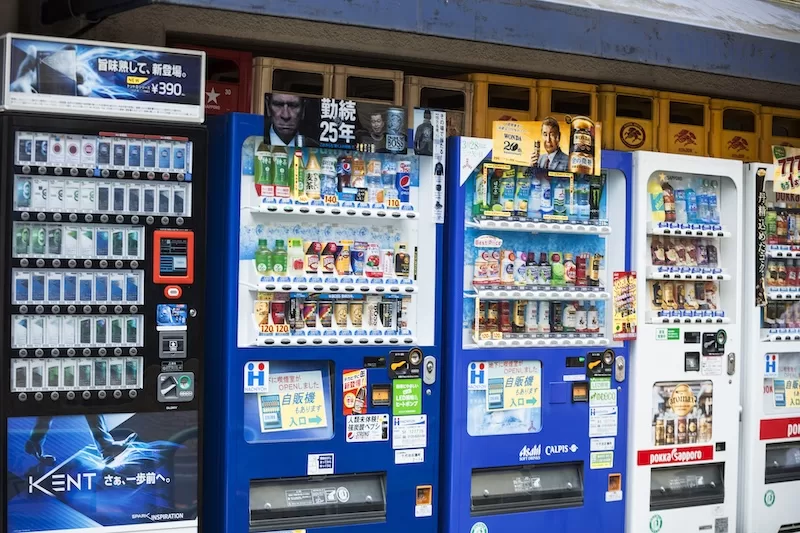
There is hardly a square meter of the archipelago that is unadorned by vending machines. Even the remotest roads on desolate mountain slopes inevitably feature one, often half-buried under snow, but always functional, dispensing barley tea at the press of a button. According to the Japan Vending Machine Manufacturers Association, there is about one machine for every 35 citizens. And although the majority of these are drink and snack dispensers, there are others that spit out products not typically associated with vending machines. You can get bananas, piping-hot soup, comic books, umbrellas and even saké at the right machines. Or phone chargers. Or surgical masks. Or your future. At some Shinto shrines, vending machines offer omikuji, or random fortunes written on strips of paper for a few hundred yen.
#6. Join a Dojo
It can be hard to make local friends in Japan. There is the language barrier, and a natural shyness that many Japanese have around foreigners. Most locals live in small apartments which further deters them from inviting people to their homes. Joining a dojo is the best chance for an outsider to “go local.” A dojo is a place where people train in a traditional Japanese practice. It can be a martial art like aikido or kendo, or as in my case, taiko (Japanese drumming). A dojo offers more than a space to perfect an art. It also serves up a community. The word itself means “place of the way,” from “do” (the path or way) and “jo” (place), hinting at something deeper than just physical practice. Fellow dojo members owe each other a quiet loyalty, and joining one offers a glimpse of local life that is not available to the average expatriate.
#7. Brush up on Chopstick Etiquette
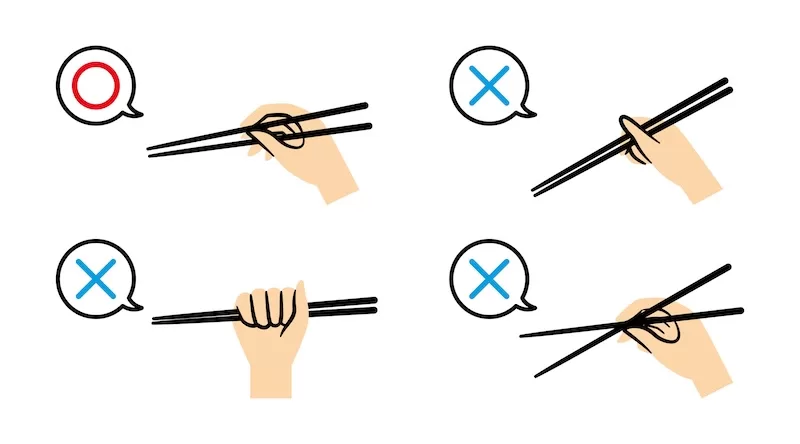
Even if you are already a dab hand at eating with chopsticks, you should brush up on the finer points of the etiquette around eating with these in Japan. It is not as easy as dig in. Here is a quick primer: Eat all the food at the end of your chopsticks in one bite. Never raise your food above your mouth. When not eating, put down your chopsticks on the supplied rest, or on the side of the plate. Never leave your chopsticks sticking out of your rice, as this resembles a Japanese funeral offering. Finally, don’t lick the ends of your chopsticks or swirl them in soup.
#8. Turn Down the Volume
In Japan, talking loudly in public spaces, whether on a mobile phone or with friends, is frowned upon in general, as it encroaches on the aural space of others – a notion entirely unknown in many other parts of the world. This includes all public transport. Even during rush-hour when the Tokyo metro is jam-packed without an inch of space for anyone to move, there is a hushed silence within the cabins. Nothing screams “ugly foreigner” more than a loudmouth.
Read more like this: Top 10 Things to Know if You’re Moving to Hawaii
#9. Expect Beauty in Unexpected Places
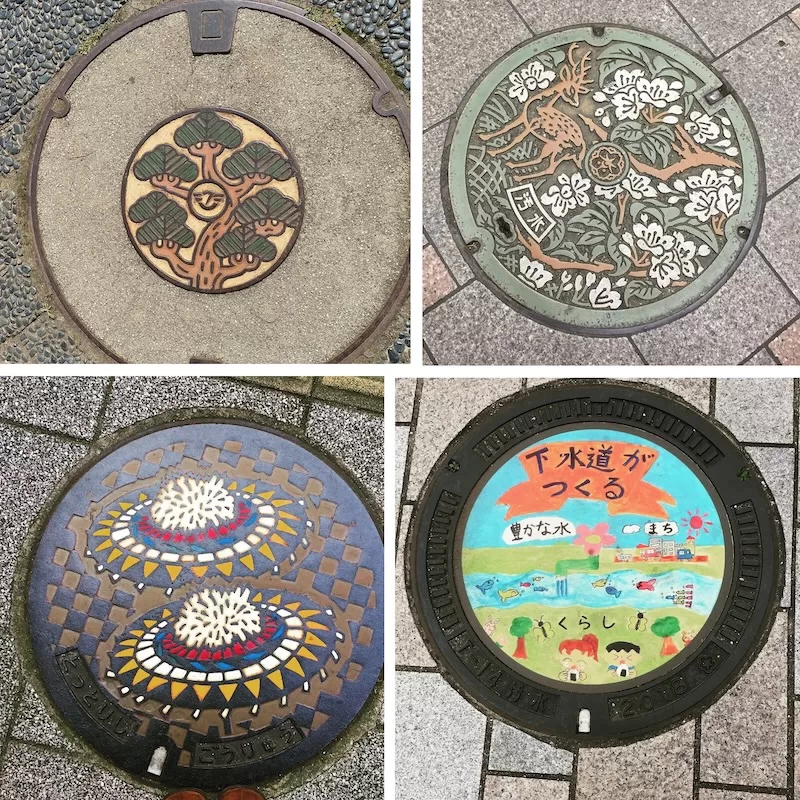
Think Japanese aesthetics and it is probably cherry blossoms or landscaped gardens that come to mind. But the longer I lived in the country the less time I spent training my eyes up at skylines and flowers and more looking down at the roads, trying to spot manholes. In Japan, the lowly manhole is its own art form with covers displaying intricate, occasionally painted, designs that reveal something of the unique history or cultural traditions of the cities whose sewers they adorn. The standard covers in Tokyo, for example, display cherry blossom petals, while in Osaka, the city castle is the dominant motif. Port cities display lighthouses and ocean scenes, fishing villages feature fish. Elements of local festivals like lanterns or certain foods are also common. According to the Japan Society of Manhole Covers (yes, there is such a thing), which maintains an online directory of designs, there are almost 6000 artistic manhole covers spread across the country with trees, landscapes, flowers and birds accounting for the majority.
#10. The 100-yen Store Can Supply All of Life’s Needs
Japan is notorious for expensive real estate. But one way to cut down on the cost of living is to find your local 100-yen store. These tiny, crammed, and endlessly inventive stores are the real economic engine of Japanese cities. The stores do exactly what they advertise: sell almost everything on their heaving shelves for 100 yen (plus a few extra yen for tax) which is about a dollar. But they are more than just a place for cheaply made tat. They are an education, where the shopper will learn about everything, they never knew they needed but simply can’t do without after encountering it. Where else can you find a mango pitter, banana-holder, owl-shaped hardboiled egg-maker, cherry blossom-shaped carrot slicer, USB cables, origami paper, Halloween masks, glue, hooks, chopsticks, socks, sponges, butterfly nets, lipstick, fake money, mannequin heads, and everything in between?

————————
Pallavi Aiyar is an award-winning foreign correspondent and the author of seven books, including, most recently, Orienting: An Indian in Japan. Follow her on X.
